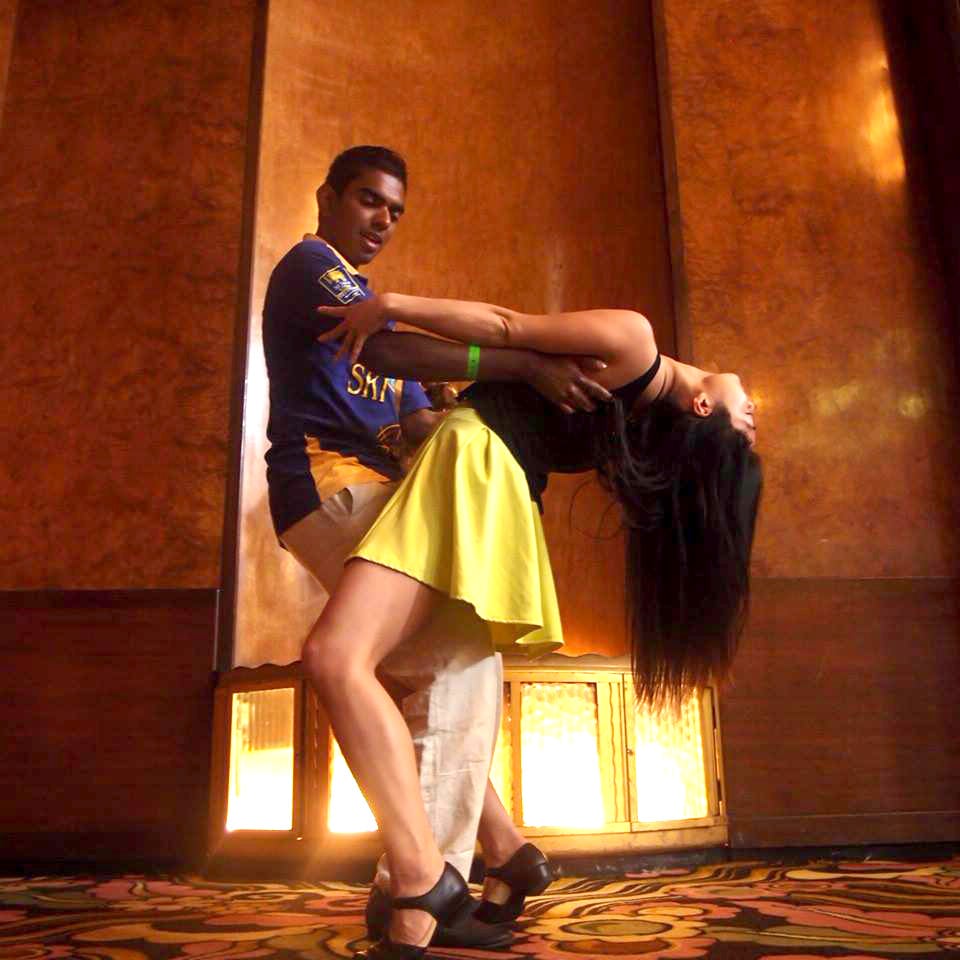My Dance Philosophy

Now I don’t identify myself as a dancer. I will leave that to the likes of Kadu Pires and Larissa Thayanne or Jordan Frisbee, or those extremely nimble and talented boys and girls from the Bolshoi. Me, I’m a twenty something (for the moment) engineer currently going through the last legs of an MBA, looking for work where my passion for the environment and sustainability can be utilized as much as analytical skills that I happen to have. Oh yeah I’m also pretty good with Excel. Basically I’m your typical skinny brown boy minus the glasses. Anyway, its sustainability and development that I want to make a contribution to in life and be remembered for.
Like most others however I have hobbies that help limit the many stresses of life and keep my sanity. These include painting and sketching, stamp and coin collecting (oh yeah!!!), Cricket (duh, I’m a Lankan) and of course writing, especially when there is a special someone to write about or to serenade with a poem (I’m a lover, not so much a fighter unless cornered). As bad as I am at these hobbies, I love them. I was particularly passionate about art, which I was actually pretty decent at, at least as a kid. I had even won a few prizes in international competitions. But for the last 8 odd years my favourite past time has been dancing, specifically Street Latin partner dances. After two paragraphs now I am finally on point.
I dance a few styles, some well enough to impress girls with, others bad enough to make them leave me hanging. I dance Salsa, Bachata, Zouk, Modern Jive, a tiny bit of Tango, a pinch of Kizomba, Merengue if I feel silly and Samba de Gafieira. Whatever the style, I love the closeness it brings to another human being, the ecstasy of trusting a potential stranger: letting our guards down, communicating without words and experiencing what teamwork is all about. I am mesmerized by the translation of sound into movement, and how two bodies and two minds will fuse together and move as one. Partner dance is an expression of selflessness, based on mutual respect, enjoyment and fulfilment.
However, some people tend to forget this last bit, and I’m sure I would have at some point unwittingly transgressed myself. As a male I am mostly a lead, and leads are the majority of transgressors anyway given the control they have. It is human want to give into temptations and forget ideals of mutuality in the heat of sensual a song. It is also important in my opinion for people to know what the point of a dance is so they can really execute it beautifully. This is why I think it’s important for leads to have a dance philosophy.
It’s not my business to tell anyone what theirs should be, or care what one’s is, and it depends on what each lead interprets as the point of their dance. It depends on the emotion they get when they look into their partner’s eyes as the space is filled with sound, be it Salsa, Bachata, Zouk, whatever. I can only share with you mine, and why. Those who know me and particularly anyone who’s ever been in my car would know the one I am crazy about, live and breathe is Zouk. That’s 90% of what you will hear from my car speakers. With Zouk, musicality is essential from day one of the learning process, unlike some others where right foot on the right beat (count) is important from the get go but greater musicality only comes in later.
By greater musicality I mean embracing the full richness of a song, the lyrics, all the different instruments and even gaps of silence to articulate their essence and feeling through movement. With Zouk it’s these occasional troughs of near silence along with the energy of the rhythm and varying tempo that makes it so rich and addictive for me. Another appeal is its utter selflessness. With Salsa it is tempting to show off, while a good Zouk lead is almost invisible. You do not dance Zouk for yourself, but for your partner, making them feel safe, look elegant and sexy. Your following partner dances for you, focusing on reading and executing inputs in more dimensions than in Salsa, giving you the pleasure of seeing your creativity in action. Thus together both fulfil each other.
Also, I discovered it at a low point in life and it made me very happy. Thus dancing Zouk stirs up many emotions and I cannot express this joy in words, but only in movement. So, when I found I was much more advanced in Zouk after 10 months compared to two and a half years of Salsa, I wondered why. It was because I was much more musical in Zouk but a pattern monkey (one who steps to the beat but just does spins and tricks and moves without any other consideration) in Salsa.
Translating the skill from one style to another meant I had to figure out what exactly do I want to do in a dance? To take a girl home? Well…anyway, ahhem. Or is it more spiritual? What really gives me that indescribable joy? As I pondered this through many a Boneca (the head flick thingy move in Zouk) to the trance of Mafie Zouker, I realized that the music gave out such an energetic feeling that I needed to express through my partner’s body and that I wanted to inject into her (usually it’s a her) body. The music spoke to me if I paid close attention, and told me through the changing rhythm, speed and sound if it’s a spin, a dip, a sweep or a turn. I felt like it was 80 years ago and I was a telegraph operator, my success depending on how well I can translate a series of short and long beeps into a sensible message. The more closely I could translate the sound into movement, the more joy I got.
Then I realized across several partners, that they also enjoyed a song more when I did a good translation. It was mutual bliss and there is nothing better than sharing your joy with another. Therein was my dance philosophy, what I aspire to every time I make a silly face and politely ask a lady for a dance.
It is to try and move her body move so in harmony and synchronicity with the music that she feels that the song is written for her.
Ambitious? Yup! Works every time? Of course not! Success rate? Somewhere between a B+ to C- depending on the dance. With Zouk I feel as I manage to fulfil the task 50% of the time, followed by about 30% for Bachata and merengue, owing negatively to my relative inexperience with them but positively to their bigger focus on musicality similarly to Zouk. With Salsa it is achieved in only about 10% of the dances I do but I’d take it happily.
Understanding and embracing my dance philosophy and then actively trying to practice it have done wonders for my dance. I’m no closer to winning titles, but I experience more fulfilling dances across more styles and genuinely feel my partners do as well. I am more confident, purposeful and have managed to build my own style that expresses what I’m about in terms of dance persona. I’m still an engineer, not a dancer, but am better able to feel and share the immense joy of music and movement, with someone I immensely care about: my partner, whoever they may be. All this, while making them feel safe, respected and comfortable. This is why I say to new leads, think about what dance is to you and what you want to give to your partner, and embrace it.
So what about the followers? Well, they need to be flexible philosophically, trust the lead and focus their skill on interpretation as different leads will have different dance philosophies, which they will try to express through the movements of themselves and their followers. The follower is the amplifier, the translator and the articulator, without whom the leader is mute and is as exciting as wallpaper. I share the philosophy I practice, and there have been a few dances where people (followers and accidental audiences) have praised my ‘skills’ afterwards. I am truly grateful for the encouragement, but I try to tell them that without my partner, I’m as good a dancer as a heavy rock.
Finally, sensitivity is critical in collaboration. It must be understood by the leads that followers also have preferences for the content of a dance. For example, Some might like to try a particular trick and leads should try to accommodate these. If these were not discussed before the dance, the follower can suggest these with subtle hints without resisting or obviously deviating from the lead given by the leader. For an example, during a normal turn in Zouk the follower may whip her hair without doing the full sweeping movement of her chest, shoulders and head (which would be contrary to the lead). To a sensitive lead paying attention to their partner, this suggests that the follower would like hair whips, which can then be accommodated.
Sensitivity to each other’s needs and focus on collaboration for mutual fulfilment will build on the foundation set by clear intent and a philosophy. The result is not only a great dance but a great night, every night (at least the ones you go dancing on and do not forget your ID). To end I will say this: If you are a selfish dancer you may have one great dance, but thanks to the eyes and ears of others you will be hard pressed to get many more. If you are a selfless dancer, you will find a selfless partner and then another, and another and many more of the same in the future no matter where you to take your dance.
About: Danidu Wijekoon
You may also like...
Sorry - Comments are closed







